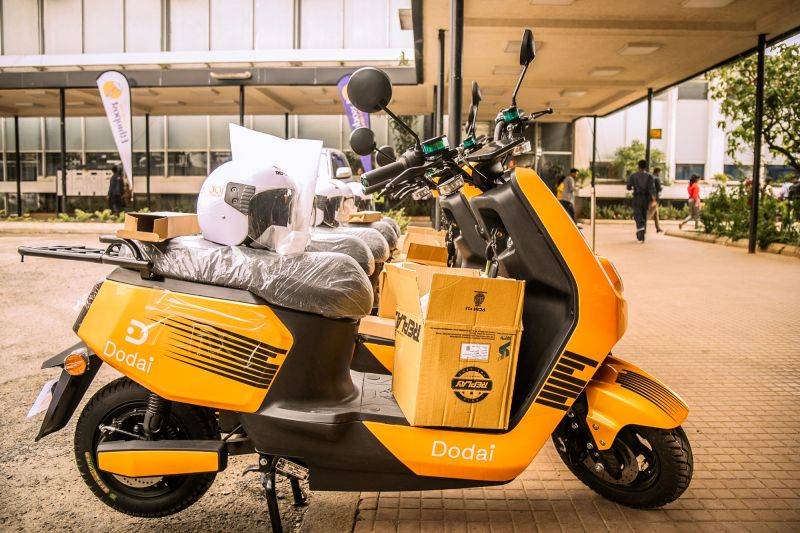Ethiopia-based Japanese e-mobility entrepreneur to launch battery-swapping service
Yuma Sasaki of Dodai secures state backing to set up 300 battery stations for e-motorbikes
 Photo source: Dodai
Photo source: Dodai
Ethiopia-based electric motorcycle firm Dodai, founded by Japanese entrepreneur Yuma Sasaki, has partnered with Ethiopian Investment Holdings (EIH) – the government’s investment arm – to establish a network of battery-swapping stations across the capital Addis Ababa. This infrastructure will allow its e-motorbike riders to swiftly swap out depleted batteries for fully charged replacements, minimising downtime.
Dodai assembles electric scooters at its 200 unit per month capacity facility in the capital Addis Ababa. The firm claims its 3.3kwH lithium battery charged e-bikes can reach a top speed of 60km and run anywhere between 120-150 km on a single charge with a top load capacity of up to 150 kg.
While motorcycles are a mainstay of urban transport in many African cities, including Ethiopia, most still rely on internal combustion engines. Dodai has sold over 500 electric bikes to date, primarily to gig economy workers like delivery drivers, who benefit from the reduced running costs of electric models compared to their fuel-powered counterparts. Ethiopia lags behind countries such as Kenya, Rwanda, Nigeria, and Ghana in the adoption of electric two-wheelers.
Over the next three years Dodai aims to install 100 battery-swap stations across Addis Ababa with plans to expand to 300 stations, including coverage in Sheger City. This model, being adopted by several electric motorbike companies across Africa, allows riders to swap or recharge batteries quickly. For instance, at Uganda-based electric motorbike company Zembo’s stations, riders scan their depleted battery, swap it for a charged one, and pay for the energy difference – all within two minutes, making it nearly as convenient as refuelling at a petrol station. Similarly, Spiro, an electric motorbike company operating in 11 African countries, uses both manned and automated stations, with the latter enabling even faster battery exchanges.
Dodai secured US$4m from Japanese investors in a Series A funding round earlier this year, boosting its total fundraising amount to $7 million. Investors include Japanese venture capital firms Nissay Capital and Inclusion Japan, along with auto parts company Musashi Seimitsu.
In an earlier interview with NTU-SBF Centre for African Studies contributor Jaco Maritz, Sasaki noted that while Japanese investors typically hold outdated views of Africa – associating it with wildlife and images of children begging – once they visit cities like Addis Ababa or Nairobi, they typically understand the potential that the continent holds. He says many are however reluctant to set up direct operations on the continent, which is why they opt to invest in companies like Dodai.
In January 2024, Ethiopia became the first country to ban the import of petrol and diesel vehicles. The move aims to curb reliance on costly fuel imports, which exceeded US$6.3bn in 2023, while advancing environmental sustainability. To drive the adoption of electric vehicles (EVs), the government has introduced tax exemptions for companies importing and assembling them. Ethiopia’s abundant renewable energy resources, particularly hydroelectric power, underpin this transition. With some of the lowest electricity costs in Africa, EVs present an affordable alternative to traditional vehicles. Earlier this month, Rwanda announced a similar initiative, stating that from January 2025, only electric motorcycles will be registered for public transport in Kigali, phasing out petrol-powered models.
An analysis by McKinsey projects that electric vehicles could make up as much as 35% of the fleet in sub-Saharan Africa’s five largest vehicle markets, excluding South Africa, by 2040. A 2022 study by the Dutch development finance institution FMO identified 50 electric vehicle startups in Kenya alone. Electric motorcycles are expected to drive this transition, as they align closely with the region’s transport needs.
References
‘E-mobility firm launches automated battery swap station in Nairobi’, The Standard, 28 February 2024
‘Assessment of Ethiopia's two-wheeler market 2015-2025 -ResearchAndMarkets.com’, Research and Markets, 24 June 2020
‘Japanese-backed firm launches electric motorbikes in Ethiopia’, NTU-SBF Centre for African Studies, 28 May 2024
‘How Ethiopia’s electric vehicle revolution paves sustainable future’, New Business Ethiopia, 27 June 2024
‘Ethiopia, the first country in the world to ban the import of gasoline and diesel vehicles’, Le Monde, 13 September 2024
‘How this Japanese entrepreneur started an e-motorbike business in Ethiopia’, How we made it in Africa, 12 October 2024
‘Signing of MoU aiming for the development of EVs equipped with Musashi technology’, Musashi Seimitsu Industry Co., Ltd, 24 October 2024
‘Rwanda to halt registration of petrol motorcycles in 2025’, The New Times, 04 November 2024
‘Investment Holdings backs electric mobility with battery swap stations’, Addis Fortune, Accessed 08 November 2024
‘Products’, Dodai, Accessed 08 November 2024
‘Charging ahead accelerating e-mobility in Africa’, Powering Renewable Energy Opportunities, Accessed 08 November 2024














/enri-thumbnails/careeropportunities1f0caf1c-a12d-479c-be7c-3c04e085c617.tmb-mega-menu.jpg?Culture=en&sfvrsn=d7261e3b_1)

/cradle-thumbnails/research-capabilities1516d0ba63aa44f0b4ee77a8c05263b2.tmb-mega-menu.jpg?Culture=en&sfvrsn=1bc94f8_1)







